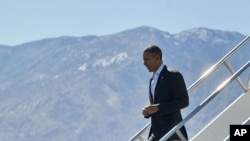Southeast Asian leaders meeting with U.S. President Barack Obama will look to agree on a list of points to be known as the “Sunnylands Principles,” which could include references to maritime navigation and militarization in the region, according to a diplomat and a draft statement obtained by VOA Khmer.
Obama is hosting the two-day summit at the Sunnylands estate in Rancho Mirage, California, starting Monday. The unprecedented act of engagement with the 10 Association of Southeast Asian Nations (ASEAN) member states is part of his administration’s efforts to counter the influence of a rising China in the region.
The draft, which appears to be an early version of a joint statement to be released at the end of the talks, was obtained from an Asian diplomat. It was unclear to what extent agreement has already been reached on the draft’s 14 principals.
The draft statement begins by saying that the U.S. and ASEAN “take this opportunity to reaffirm the key principles that will guide our cooperation going forward.”
It affirms the two sides commitment to free trade and to building “stronger democracies, good governance, promotion and protection of human rights and fundamental freedoms, and the promotion of tolerance and moderation.”
The draft principles also back a multilateral approach to dispute resolution, affirming “Respect for ASEAN centrality as a guiding principle in shaping the multilateral architecture of the Asia-Pacific.”
It contains clear allusions to the territorial disputes in the South China Sea between ASEAN nations and China.
China and its allies in the region, primarily Cambodia, have previously rejected calls from Vietnam and the Philippines for these disputes to be solved through ASEAN. China prefers to deal with the disputed islands and atolls bilaterally with smaller nations.
Key principles in the draft affirm “Peaceful resolution of disputes, including through arbitration, in accordance with international law;” and “The importance of unimpeded lawful commerce, including the rights of freedom of navigation and overflight as described in the UN Convention on the Law of the Sea, as well as a commitment to non-militarization.”
Both Cambodia and neighboring Laos, which have received large amounts of financial aid from China in recent years, could find themselves in a tricky position if asked to commit to these principles.
John D. Ciorciari, a professor at the Gerald R. Ford School of Public Policy at the University of Michigan who studies Southeast Asia, told VOA Khmer that the increased U.S. engagement with ASEAN—embodied by the Sunnylands summit—gave individual leaders like Cambodian Prime Minister Hun Sen leverage, since ASEAN’s internal policies require consensus among the 10 states to commit to any action, including the issuing of a joint statement.
"U.S. officials want Cambodia not to block consensus when a majority of ASEAN members favor diplomatic language or action asserting a common stand on the South China Sea,” Ciorciari said. “In the past, especially when chairing ASEAN in 2012, Cambodia has been accused of serving as a Chinese lackey and keeping ASEAN from taking collective positions unfavorable to Beijing.”
As it seeks to build its strategic position in the region, the U.S. has been accused of taking a soft line on human rights issues in Southeast Asia. Critics have remarked that handing Cambodia’s Hun Sen the credibility boost of an official visit to the U.S. could embolden the long-serving prime minister at a time when opposition leader Sam Rainsy has recently been forced back into exile.
On Thursday, Obama’s deputy national security adviser for strategic communications, Ben Rhodes, publicly raised concerns about the worsening political climate in Cambodia, according to the Associated Press.
Peter Maguire, a legal scholar and long-time Cambodia researcher, noted that the criticism of Hun Sen’s government just before the Sunnylands summit came from Rhodes rather than Secretary of State John Kerry, meaning that the human rights in Cambodia were not a foreign policy priority.
"The U.S. obviously wants Cambodia and the ASEAN nations to stand firm against Chinese territorial claims,” Maguire said, adding that it was unlikely Hun Sen would turn his back on his generous patron.
“However, given Cambodia’s relationship with China, why would they bite the hand that has fed them so generously?” he said. “Love him or hate him, Hun Sen has forgotten more about realpolitik than the entire Obama administration will ever know. When they were in diapers, he was on the battlefield."







